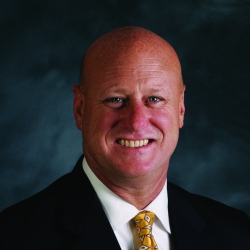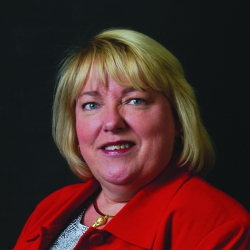
Ashley Collins of Collins Builders provides a builder's perspective on the market in 2009.
Advantage: Buyers, an Industry Q&A
But there’s a growing consensus that 2009 will mark the beginning of a gradual comeback as an array of federal economic stimulus programs—many aimed at reviving housing—are implemented.?
Already, mortgage interest rates for qualified buyers have sunk below historic lows and home prices have retreated to pre-boom levels.
With that in mind, Florida Homebuyer Jacksonville" target="_blank">Jacksonville" target=_blank>Jacksonville" target="_blank">Jacksonville asked several industry heavyweights, including builders, developers and Realtors, to share their thoughts on what the next 12 months may hold.
Of course, no one can say for sure. However, our panel agreed across the board that fence-sitters should act now, before prices and interest rates begin to rise. Asks Millie Kanyar of Watson Realty: “If you’re waiting to buy, then what exactly are you waiting for?”
Adds Mark Refosco of Arthur Rutenburg Homes/Marcus Allen Homes: “Everything has a way of balancing eventually, and in the next few years, housing values will be balanced. The losses people feel today from buying during the peak will be softened significantly, and people buying today will enjoy a normal rate of appreciation.”
In addition to Refosco, we interviewed builders Ashley Collins of Collins Builders and Andy Chambers of Engle Homes. Our expert developers included Roger Arrowsmith of East West Partners, Mike Balanky of Chase Properties and Jason Sessions of Sessions Development.
Rounding out our panel were Realtors Kanyar, who is also president of the Northeast Florida Association of Realtors; Teresa Mercurio of RE/MAX, who is also president of the St. Augustine/Jacksonville" target="_blank">Jacksonville" target=_blank>St. Johns County Board of Realtors; and Sam Kellum of Watson Realty, who is also president of the Amelia Island/Jacksonville" target="_blank">Jacksonville" target=_blank>Nassau County Association of Realtors.??
Here’s what they had to say:??
?
BUILDERS
Do you feel the new-home market has hit bottom and is poised for turnaround, or is there still further to fall? Collins: I think the value of new homes has stopped falling. In fact, I predict that any future decreases will be the result of lower land costs and fewer features in the homes, not lower construction costs.
Collins: I think the value of new homes has stopped falling. In fact, I predict that any future decreases will be the result of lower land costs and fewer features in the homes, not lower construction costs.
 Refosco:
Refosco:
?
 Chambers: I agree that new-home prices must be very close to the bottom. But you also have to remember that the bottom is not a point in time, but a period of time. There are a lot of indications that lead us to believe we are in this period but we’ll only know for sure when we see it in the mirror.
Chambers: I agree that new-home prices must be very close to the bottom. But you also have to remember that the bottom is not a point in time, but a period of time. There are a lot of indications that lead us to believe we are in this period but we’ll only know for sure when we see it in the mirror.
What are your predictions for the building industry for 2009?
Collins: Sales should be slightly up but prices will remain about the same. There will be some more affordable communities coming on line but the supply will still be far less than what we experienced during the 2003-2005 building boom.
Refosco: I think there’ll be improvement based on the fact that we keep seeing the same folks visiting our models month after month—and people do want to buy homes.? Often a buyer will need to first sell a home. But sometimes the home that they want to sell is priced too high. For example, one couple who recently bought one of our homes lost nearly $100,000 off the appraisal value of their current home compared to its value last year. But they knew they’d make up the difference by getting a great deal on their new home. They’re not alone in their thinking, and people are getting tired of waiting.
Chambers: There’ll likely be another partial year of low absorption and lean margins. Hopefully by the third quarter we’ll begin to see an upward climb.
What are the factors influencing your outlook?
Collins: Factors impacting the real estate market include a lack of available financing, declining prices and the economy in general. The real estate market is still driven primarily by consumer confidence, and that needs to be restored for real improvement to take place.
Refosco: The reality is we are probably already looking toward better times. The financial experts who report findings in the media are usually a few months behind what everyone already knows. We’re on the front lines talking with real people every day and we see the future first. The benefits of buying a home are obvious. But the simple decision has been clouded lately by economic turmoil. I’m betting we’ll see people making adjustments in their thinking and moving forward.
Chambers: The factors that we look for are resales, foreclosures, builder inventory, employment and interest rates. But the biggest thing to watch will be consumer confidence.
DEVELOPERS
How has the current economic climate impacted developers specifically? Arrowsmith: With little revenue from land sales coming in, we must continue to give people the community experience that they bought into, even if it means sacrificing financially to do so. Over the next year, you can expect to see little, if any, new development activity going on as developers continue to work through their existing inventory of homes, both new and resale, and homesites.
Arrowsmith: With little revenue from land sales coming in, we must continue to give people the community experience that they bought into, even if it means sacrificing financially to do so. Over the next year, you can expect to see little, if any, new development activity going on as developers continue to work through their existing inventory of homes, both new and resale, and homesites.
?
 Balanky: The tightening of the credit market has substantially affected the appetite of most developers for traditional projects. Creativity, in the formation of leverage, is going to be the key for the next 18 to 24 months.
Balanky: The tightening of the credit market has substantially affected the appetite of most developers for traditional projects. Creativity, in the formation of leverage, is going to be the key for the next 18 to 24 months.
? Sessions:
Sessions:
How have you changed the way you do business this year?
Arrowsmith: We’re spending more dollars on marketing and are being more aggressive in finding new ways and new places to look for homebuyers. At the same time, we’re taking a long, hard look at all overhead expenses.
Balanky: We have more of a “wait and see” approach to projects. With the possibility of government financial assistance packages dramatically altering the financial landscape tomorrow, it wouldn’t be fiscally responsible to lock into a deal today. It may be much more conducive to re-enter the market down the road.
Sessions: While we haven’t changed the way we do business, we have done less due to the condition of the market. Currently we’re only developing parcels where the builders already have contracts for the land. We’re not doing any of the speculative building that you may have seen in the past.
What do you see on the horizon as far as trends in development for 2009?
Arrowsmith: We’re already starting to see an increased level of interest for 2009, but consumers are still looking for deals. Developers will be doing everything possible to stay in business as the down cycle begins to turn. I predict amenitized communities will once again lead the way, no matter what the price, because they have more to offer than just a home.
Balanky: As liquidity returns to the market, so will development. However, the days of 90 percent leverage are probably gone, which may be a benefit to the public in the long run by thinning the field and providing fewer, albeit higher quality, projects. Transit-oriented developments and public/private partnerships are two areas that still generate strong interest even in tough times. And while urban infill projects should fare well, their success will also depend on how the city center is affected by the loss or reduction in workforce due to the current credit crisis.
Sessions: I think 2009 will continue to be a difficult year for the development business. We’ll likely see even more projects struggle with slow sales. The good news is that housing is still very affordable in Jacksonville" target="_blank">Jacksonville" target=_blank>Jacksonville" target="_blank">Jacksonville compared to many markets across the U.S. And interest rates are still very attractive for qualified buyers.
REALTORS
What should buyers expect in terms of home pricing, availability and appreciation during the upcoming year? Kanyar: Predicting the market is difficult, but what’s certain is that there’s an undetermined level of pent-up demand for homes. At some point this demand will break as potential buyers decide to enter the market. A home remains a very viable, long-term investment. And the equity in a home is the largest component of financial strength for many people.
Kanyar: Predicting the market is difficult, but what’s certain is that there’s an undetermined level of pent-up demand for homes. At some point this demand will break as potential buyers decide to enter the market. A home remains a very viable, long-term investment. And the equity in a home is the largest component of financial strength for many people.
 Kellum: It appears that prices are at or near the bottom for the properties that are selling, so I would expect prices to stabilize soon. Sellers also need to understand that we’re in a correcting market, and they can’t expect homes to sell for 2006 or 2007 prices. For buyers, the inventory of available homes is exceptional.??
Kellum: It appears that prices are at or near the bottom for the properties that are selling, so I would expect prices to stabilize soon. Sellers also need to understand that we’re in a correcting market, and they can’t expect homes to sell for 2006 or 2007 prices. For buyers, the inventory of available homes is exceptional.??
 Mercurio: I think we’ll see prices decline for another few months and availability get even stronger with a growing number of bank-owned real estate opportunities coming onto the market. Unfortunately, appreciation won’t be a factor until late 2009 or early 2010, and then we expect a standard annual appreciation of 3 to 5 percent will return.?
Mercurio: I think we’ll see prices decline for another few months and availability get even stronger with a growing number of bank-owned real estate opportunities coming onto the market. Unfortunately, appreciation won’t be a factor until late 2009 or early 2010, and then we expect a standard annual appreciation of 3 to 5 percent will return.?
What advice do you have for homebuyers who have been waiting to jump into the market?
Kanyar: First, I’d ask the question, “What exactly are you waiting for?” It’s hard to fathom a better time for buyers than right now, with so many housing choices, affordable prices and continued low interest rates. And despite the news about our financial markets, local lenders are assuring us that there’s still money available.
Kellum: The prices for which homes are selling right now are realistic, and qualified buyers are definitely in the driver’s seat. Low interest rates started this real estate boom and it’s inevitable that interest rates will increase. I think buyers who are in a position to purchase can’t afford to wait.
Mercurio: In addition, the government is offering a tax credit to first-time homebuyers of up to $7,500. That’s yet another reason to buy now if you’ve been sitting on the fence. And while lenders have tightened their belts, if you have good credit and a stable job, it’s truly not a problem to get financing.
How would you sum up the state of the housing market today and what do you feel is in store for 2009 in the real estate industry?
Kanyar: In spite of dire forecasts, Florida homes sales rose by 24 percent in September 2008 compared to September 2007. Jacksonville" target="_blank">Jacksonville" target=_blank>Jacksonville" target="_blank">Jacksonville is poised to rebound and our economic indicators and job growth potential—with increased port activity and Asian shipping companies moving into our area—are strong. Property taxes in Duval County are also less compared to other Florida metro areas. We hope potential buyers will take the time to look at the real situation and not be swayed by the negativity that typically makes headlines.
Kellum: Our housing market is definitely in a correcting phase, with a tremendous inventory of pre-owned homes. Pricing should start to stabilize toward the end of 2009, and correct pricing is critical to selling a home in this market. To attract buyers, a home must be listed just below market comparisons. I think sales this year will be the same or slightly better than 2008 levels.
Mercurio: After a very slow 2008, it looks like the year will end on an up note. Properties are moving and people are feeling like they’ve gotten good buys. Inventory is still high, however, and sellers are struggling. If you don’t have to sell right now, I would advise waiting.
NEFBA President: Look for Gradual Improvement in ‘09
 Glenn Layton
Glenn Layton
Division President,
Woodside Homes
President,
Northeast Florida Builders Association
Q. What is your outlook for the local homebuilding industry in 2009?
A. We expect 2009 to be an extension of what we’ve experienced the past 12 months. Sales of new homes increased slightly in the last quarter of 2008 and the numbers are expected to be the same, if not better, especially picking up during the second half of the coming year. As inventory continues to move, this should clear the way for additional homes to be built—thus stepping up local activity.
Q. What is the total economic impact of housing on the Jacksonville" target="_blank">Jacksonville" target=_blank>Jacksonville" target="_blank">Jacksonville area?
A. The housing industry has proven —on both the national and local levels—to be a key catalyst to the success of the economy. Not only does a healthy housing market create thousands of jobs directly related to the construction industry, it also influences industries such as automotive, furniture and furnishings, insurance, advertising and finance. We are feeling the effects of the slowdown throughout our local economy. And as the housing market improves, these other areas will benefit as well.
Q. Do you expect the Jacksonville" target="_blank">Jacksonville" target=_blank>Jacksonville" target="_blank">Jacksonville market to recover faster or slower than the nation as a whole?
A. Northeast Florida has fared better than most other areas of Florida during the past 30 months of downward sales and Jacksonville" target="_blank">Jacksonville" target=_blank>Jacksonville" target="_blank">Jacksonville ranks about average compared with other national cities. Our area continues to see steady growth and diverse job opportunities. That will contribute to a quicker recovery for our market.
Q. What’s the strongest argument for buying a home now instead of waiting another year?
A. New home pricing is at an eight-year low, interest rates are favorable and available builder incentives make an extremely strong statement that now is a great time to buy. The market is going to continue to go up and waiting will likely cost not only time but also money.
Q. What is the biggest challenge facing NEFBA members in the coming year?
A. I believe that each member of our organization faces individual challenges specific to their business —whether they’re a builder, a developer or an associate. The challenge for our organization as a whole is providing support to our members through education, promoting members doing business with other members and helping our industry move forward in 2009.
